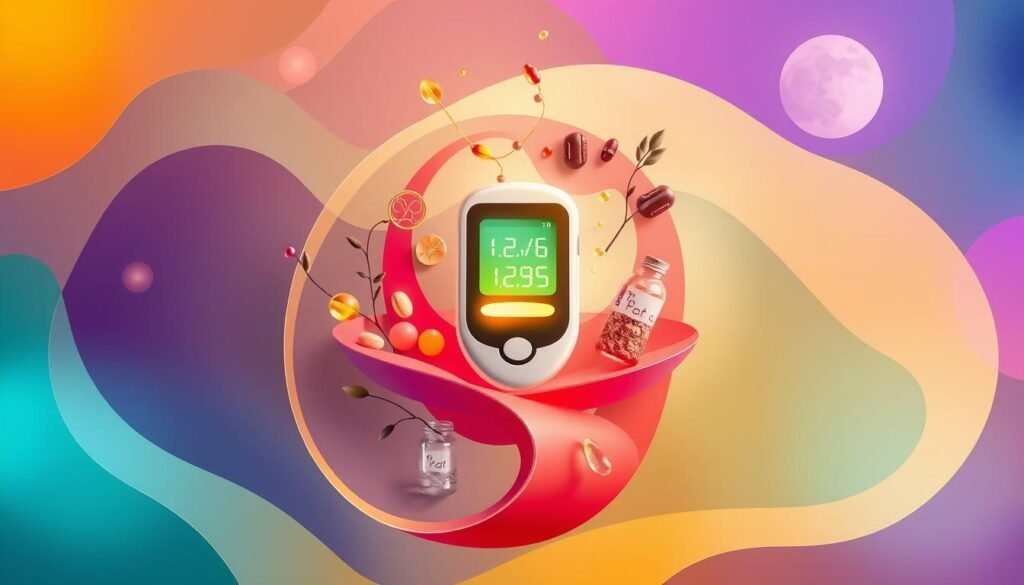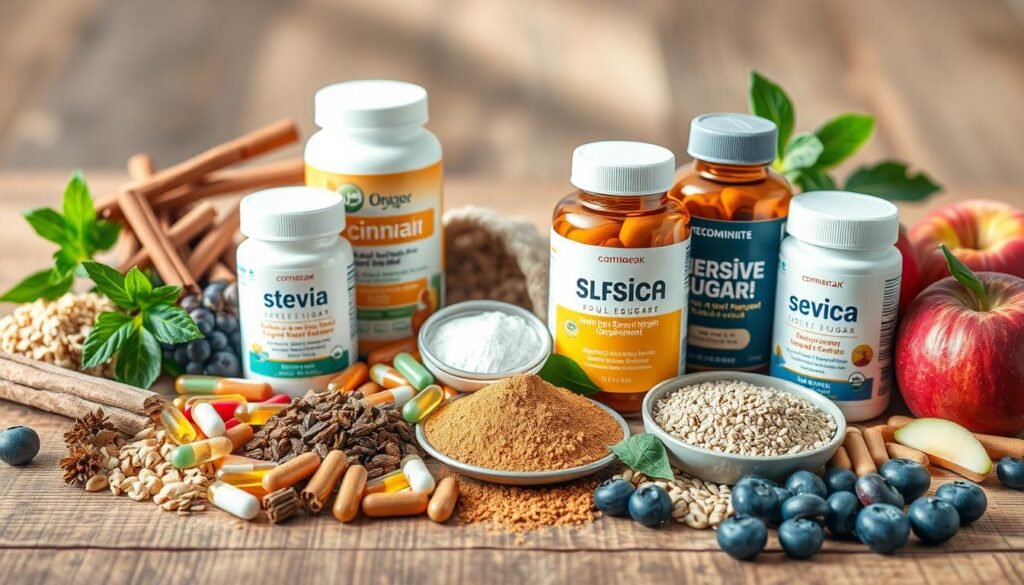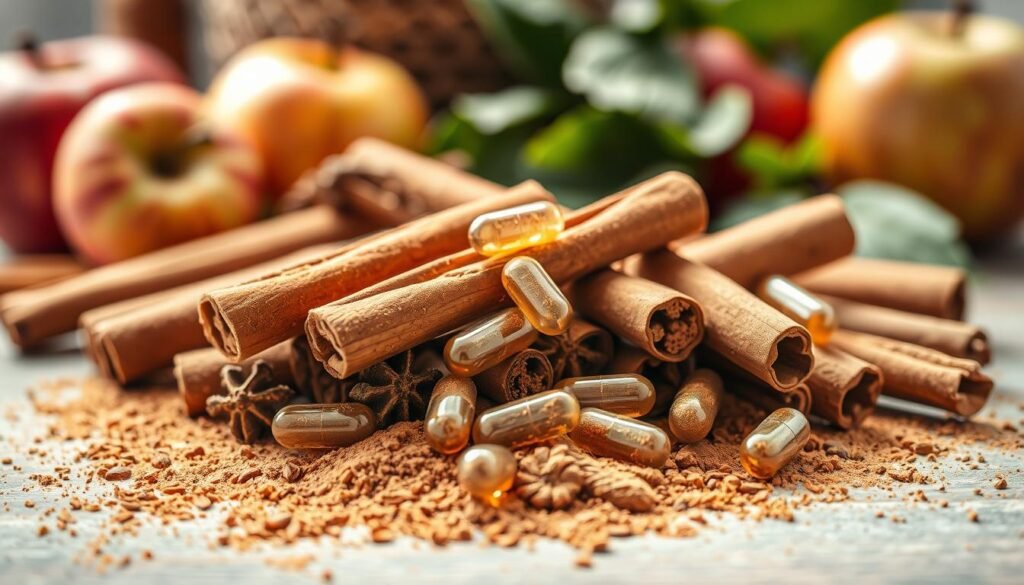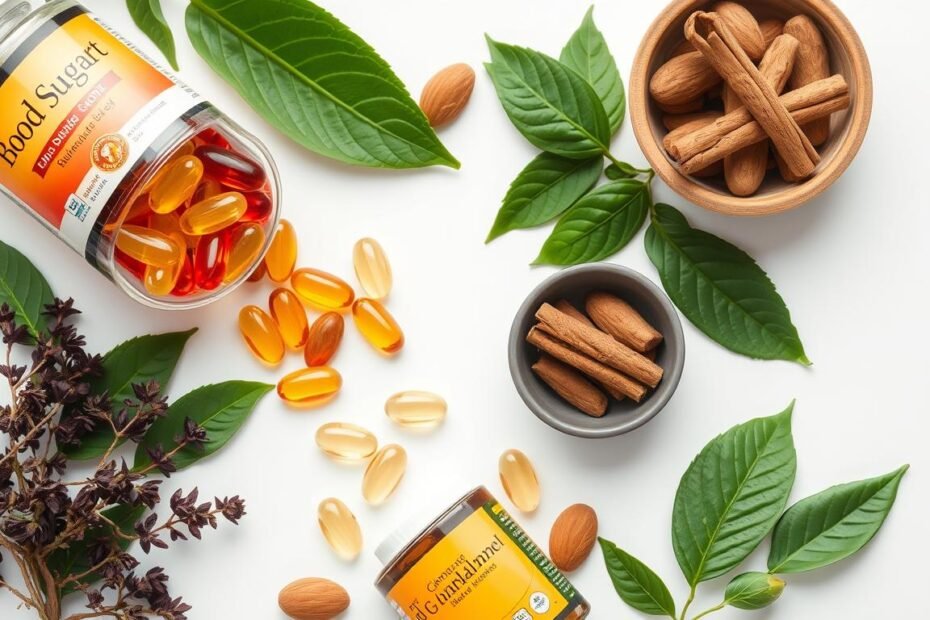Ever thought about a natural way to manage your blood sugar? I’ve looked into natural supplements for blood sugar control. These supplements are getting popular, especially for people with diabetes or pre-diabetes.
There are many supplements that could help, like cinnamon and berberine. But which ones are effective? I’ve checked the research to find the best options for diabetes support. Let’s see how these natural supplements can help keep your blood sugar in check and maybe lessen your need for traditional medicines.
Key Takeaways
- Natural supplements can aid in blood sugar control
- Berberine and aloe vera show promising results in clinical studies
- Vitamin D deficiency is common in type 2 diabetes patients
- Gymnema Sylvestre may help reduce sugar absorption
- Consult a healthcare provider before starting any supplement regimen
Supplements can be great for managing blood sugar, but be careful. Berberine has been shown to lower blood sugar by 15.5 mg/dl and A1C by 0.71% in type 2 diabetes patients1. Aloe vera also helped lower blood sugar by 46.6 mg/dl and A1C by 1.05% in type 2 diabetes patients1.
Many people with type 2 diabetes lack vitamin D. In one study, 72% were deficient, but after taking supplements, their blood sugar and A1C levels got better1. This shows how important it is to fix nutrient gaps in diabetes care.
But remember, supplements aren’t checked by the FDA, so their safety and effectiveness aren’t always certain2. The American Diabetes Association says to only take supplements if you have a specific nutrient deficiency2. Always talk to your doctor before starting any supplements, as they can interact with medicines or cause side effects2.
In my search for blood sugar control, I’ve found that supplements can be useful but aren’t magic. A good diet, exercise, and proper medical care are still key. Supplements should be seen as helpful tools, not a replacement for proven diabetes care.
Understanding Blood Sugar and Its Impact on Health

Blood sugar, or blood glucose, is key to our body’s energy making. I’ll cover what it is, why it’s important, and the dangers of poor control.
What is blood sugar?
Blood glucose is the main sugar in our blood. It’s the main fuel for our cells, powering our brain and muscles. Our bodies keep blood sugar levels just right for good health.
The importance of maintaining healthy blood sugar levels
It’s vital to keep blood glucose stable for our well-being. Eating right, staying active, and drinking enough water help with this. Drinking 34 ounces of water daily can lower high blood sugar risk by 21%3. For those with diabetes, eating well is key4.
Risks associated with uncontrolled blood sugar
High blood sugar can cause big health problems. In the U.S., 38.4 million people have diabetes, and 23% don’t know it3. Regular check-ups and monitoring blood sugar are crucial. Without good control, it can lead to heart disease, kidney damage, and nerve issues.
| Supplement | Potential Benefit |
|---|---|
| Magnesium | Improved insulin sensitivity and blood sugar control35 |
| Chromium | Enhanced insulin sensitivity when combined with magnesium3 |
| Vitamin D | Reduced risk of type 2 diabetes5 |
About 70% of adults with diabetes use supplements to help manage their blood sugar5. But, it’s important to talk to a doctor before starting any new supplements. A mix of diet, exercise, and supplements can help keep blood glucose in check and lower diabetes risk.
The Role of Supplements in Blood Sugar Management

Supplements are getting more attention for helping with blood sugar control and diabetes. Many people use them to support their body’s glucose and insulin levels. Some supplements have shown they can help manage blood sugar levels well.
Cinnamon is one supplement that can lower fasting blood sugar and make insulin work better in people with type 2 diabetes or prediabetes6. Magnesium also helps with blood sugar and insulin sensitivity in those with diabetes or at risk of it6.
Vitamin D supplements could be good for people with type 2 diabetes and not enough vitamin D. Taking high doses for a short time can lower fasting blood sugar and HbA1c levels6. This shows how important supplements can be in a full wellness plan.
Remember, supplements should not replace regular medical care. How well they work can change from person to person, and they might affect other medicines. Always talk to a doctor before starting any supplements for diabetes.
“Supplements can be a valuable tool in managing blood sugar levels, but they work best when combined with a healthy lifestyle and proper medical care.”
Good nutrition is key to controlling blood sugar, but it affects more than just health. Depression can raise the risk of getting diabetes, showing how mental and physical health are linked7. This shows we need to look after both our mind and body for good health.
Cinnamon: A Popular Spice for Glycemic Control

Cinnamon supplements are now widely used to help control blood sugar levels. I’ve looked into how this spice can help manage glycemic levels. Let’s explore the types, benefits, and how to use cinnamon for blood sugar control.
Types of Cinnamon Supplements
There are two main types of cinnamon in supplements: Cinnamomum zeylanicum (Ceylon cinnamon) and Cinnamomum cassia (Chinese cinnamon). Ceylon cinnamon is more expensive but has more antioxidants and health benefits. Cassia cinnamon is cheaper but has more coumarin, which could harm the liver if taken in large amounts8.
Potential Benefits and Mechanisms
Cinnamon may help make insulin work better and improve glucose uptake. A 2019 review showed that cinnamon lowered fasting blood sugar and insulin resistance in people with type 2 diabetes and prediabetes8. Another study found that cinnamon could lower hemoglobin A1c by 0.27% to 0.83% and fasting blood sugar by up to 52.2 mg per deciliter in type 2 diabetes patients89.
Recommended Dosage and Precautions
Studies often use daily doses of 1 to 6 grams of cinnamon. A 2019 study found that 3 to 6 grams of cinnamon helped improve certain blood levels89. But, taking more than 2.5 grams of Cassia cinnamon a day could be risky for a 165-pound person because of its high coumarin content8.
Cinnamon supplements are usually safe for short-term use in small amounts. But, taking high doses for a long time could cause side effects. People with liver disease should be careful10. Always talk to a healthcare provider before adding cinnamon supplements to your diet, especially if you have diabetes or prediabetes.
Alpha-Lipoic Acid: An Antioxidant Powerhouse

Alpha-Lipoic Acid (ALA) is a supplement that’s getting a lot of attention. It’s known for helping with blood sugar control and overall health. ALA is a strong antioxidant that fights oxidative stress and can make insulin work better11.
Studies show that ALA can help with glucose levels and improve vision quality. In one study, ALA increased superoxide dismutase, an antioxidant enzyme11. This means ALA supplements could help keep blood sugar healthy and fight oxidative stress.
But ALA does more than just help with blood sugar. It can also help with weight loss, with people taking ALA losing more weight than those on placebos12. It’s also linked to less inflammation and better cholesterol in people with metabolic diseases12.
Even though ALA is in foods like broccoli, spinach, and red meat, supplements give you much more. In fact, supplements can have up to 1,000 times more ALA than what you get from food12.
| Food Source | ALA Content |
|---|---|
| Broccoli | Low |
| Spinach | Low |
| Red Meat | Moderate |
| ALA Supplement | High |
When picking ALA supplements, choose quality ones like Alpha Lipoic Acid IR. These supplements support antioxidants all over the body, help with glucose uptake, and support cell metabolism13. Always follow the dosage instructions and talk to a healthcare provider before starting any new supplements.
Berberine: Nature’s Blood Sugar Regulator
Berberine is a compound found in plants that helps control blood sugar levels. It has been used in traditional Chinese medicine for over 400 years14.
How Berberine Works in the Body
Berberine supplements boost insulin sensitivity and help cells take in glucose better. Studies show it increases insulin production and lowers cell resistance. This leads to lower blood sugar levels14. It’s especially good at fighting insulin resistance, which affects over 80% of Type 2 diabetes patients14.
Clinical Studies and Effectiveness
Many studies prove berberine’s power in managing blood sugar. Clinical trials show it can lower fasting blood glucose and boost insulin sensitivity in diabetics. Some studies had participants take 500 mg of berberine two or three times a day15.
Berberine does more than just control blood sugar. It can also lower cholesterol, reduce blood pressure, and help with weight loss14. A small trial found significant weight loss in those taking berberine daily for three months14.
Possible Side Effects and Interactions
Even with its benefits, berberine might have side effects. Some may get nausea, diarrhea, or constipation15. Always talk to a healthcare provider before starting berberine, especially if you’re on other meds.
| Benefit | Evidence | Dosage |
|---|---|---|
| Blood Sugar Control | Improves insulin sensitivity | 500 mg, 2-3 times daily |
| Weight Management | Promotes weight loss | Varies by study |
| Cholesterol Reduction | Lowers total and LDL cholesterol | 500 mg, 2-3 times daily |
In conclusion, berberine is a natural way to manage blood sugar. Its ability to enhance insulin sensitivity and glucose uptake makes it a great choice for those looking to control their blood sugar naturally.
Gymnema Sylvestre: The Sugar Destroyer
Gymnema sylvestre, known as the “sugar destroyer” in Ayurvedic medicine, helps control blood sugar levels. It’s a plant that can make sugar taste bad16. This herb is great for your health and blood sugar control.
Studies show gymnema supplements can lower blood sugar in type 2 diabetes patients16. Taking 200-400 mg of gymnemic acid can cut down on sugar absorption17. This is why a study found people taking gymnemic acid ate 44% fewer sweets than those on a placebo16.
Gymnema sylvestre does more than just control blood sugar. It can help with weight and heart health. It lowers triglycerides and LDL cholesterol by about 20% in obese people17. Gymnema might help with weight loss when used with a healthy diet16.
But, gymnema should be used with a doctor’s advice. It can increase insulin and cause low blood sugar in some16. Pregnant women, breastfeeding moms, and kids should not take gymnema supplements17.
| Benefit | Potential Effect |
|---|---|
| Blood Sugar Control | Reduces fasting blood glucose |
| Cholesterol Management | Decreases triglycerides and LDL |
| Weight Management | May aid in weight loss |
| Sugar Cravings | Suppresses taste of sugar |
Always talk to a doctor before starting gymnema, especially if you have diabetes or take other meds. The benefits are promising, but we need more studies to know how it works best for blood sugar control.
Best Supplements to Control Blood Sugar
I’ve looked into some top mineral and vitamin supplements that might help with blood sugar control. A balanced diet is crucial, but some nutrients can also help manage glucose levels.
Chromium Picolinate
Chromium picolinate is a mineral supplement that could make insulin work better. It helps the cells in the pancreas that make insulin, which might help control blood sugar. But, we need more studies to be sure it helps with diabetes.
Magnesium
Magnesium is key for insulin to work right and for body tissues to use insulin well. Those with insulin issues and type 2 diabetes often have low magnesium levels18. Taking magnesium supplements can help with fasting blood sugar and lipid levels in people with diabetes.
Vitamin D
Vitamin D might help reduce insulin resistance, especially in those who are deficient. A study showed that people with prediabetes who took vitamin D cut their diabetes risk by 15%19. Adults need 600 IU daily if 19-70 years old, and 800 IU if 71 or older19.
Omega-3 Fatty Acids
Omega-3 fatty acids have had mixed results in controlling blood sugar. But, they might help lower triglyceride levels in people with type 2 diabetes. These supplements could be part of a plan to manage blood sugar.
The American Diabetes Association says there’s no proof that vitamin or mineral supplements help people with type 2 diabetes unless they’re lacking them18. Always talk to a healthcare provider before starting any supplements for blood sugar control20.
Probiotics: Balancing Gut Health and Blood Sugar
I’ve learned that probiotics are key for gut health and keeping blood sugar stable. These good bacteria help manage diabetes and boost metabolic health.
The gut-blood sugar connection
The connection between gut health and blood sugar is quite interesting. Studies show that changes in gut bacteria can tell if someone might get diabetes. People with stable blood sugar have more good gut bacteria than those at risk of diabetes21.
A big study with 2972 people found that probiotic supplements lowered blood sugar and insulin levels. They also made insulin work better and reduced insulin resistance22.
Selecting the right probiotic strains
When picking probiotics for blood sugar, focus on certain strains. Lactobacillus and Bifidobacterium are good for lowering blood sugar and fighting inflammation21.
Probiotics had a bigger impact on blood sugar in women with gestational diabetes and healthy pregnant women. They didn’t help as much in overweight or obese women22.
Potential benefits for diabetics
For diabetics, probiotic supplements can be very helpful. A study found that diabetic rats lowered their blood sugar after 90 days of probiotics. Another study in 2015 showed that Lactobacillus casei stopped insulin resistance from high-fat foods21.
| Probiotic Strain | Potential Benefit |
|---|---|
| Lactobacillus casei | Prevents insulin resistance |
| Akkermansia muciniphila | Improves metabolic health |
| Lactobacillus and Bifidobacterium | Lowers fasting blood glucose |
Probiotics look good for managing blood sugar, but talk to a doctor before starting them. This is especially true for people with diabetes or other health issues.
Herbal Supplements for Blood Sugar Control
Herbal remedies are becoming more popular for managing diabetes naturally. I’ve looked into many options that could help control blood sugar levels. It’s important to remember that these supplements should add to, not take the place of, regular treatments23.
Fenugreek seeds are something I find interesting. Eating 10g of soaked fenugreek seeds in hot water every day for six months can lower blood sugar and HbA1c levels in type 2 diabetes patients24. Gymnema sylvestre is another herb that caught my eye. Taking 400 mg of it daily can cut down insulin use and lower blood sugar levels in type 1 diabetes patients24.
Cinnamon is more than just a spice to add flavor. Taking a 500 mg water extract of cinnamon every day for two months can make insulin work better and lower blood sugar, insulin, and cholesterol levels24. Ginseng and turmeric, which contains curcumin, have also shown to help control blood sugar and may prevent type 2 diabetes24.
| Herb | Potential Benefits | Recommended Dosage |
|---|---|---|
| Fenugreek | Reduces fasting blood sugar and HbA1c | 10g seeds daily |
| Gymnema | Decreases insulin requirements | 400 mg daily |
| Cinnamon | Improves insulin sensitivity | 500 mg extract daily |
| Ginseng | Improves fasting blood sugar levels | Varies |
Even though these herbal supplements look promising, the FDA doesn’t check them as closely as it does medicines23. Always talk to a healthcare professional before adding any new supplements to your diabetes care plan. They might not mix well with your current medicines or could have side effects you’re not expecting.
Combining Supplements with Lifestyle Changes
For managing diabetes holistically, mixing supplements with lifestyle changes is crucial. A full approach to controlling blood sugar works best.
Diet and nutrition tips
Eating right is key to keeping blood sugar in check. I suggest eating 25-35 grams of fiber each day, as advised by the American Diabetes Association25. Foods high in fiber like whole grains, fruits, and veggies help keep glucose stable. Some research suggests viscous fiber supplements can also help manage diabetes25.
Exercise recommendations
Exercise is vital for controlling blood sugar. Studies show it boosts insulin sensitivity and keeps glucose levels in check25. Try to do at least 150 minutes of moderate aerobic activity or 75 minutes of vigorous activity each week, spread out over three days.
Stress management techniques
Stress can raise blood sugar levels. It’s important to reduce stress for better diabetes management. Techniques like meditation, yoga, or deep breathing can lower stress hormones that affect glucose levels26. Long-term stress management can improve blood sugar control in people with type 2 diabetes2526.
By adding these lifestyle changes and supplements, you can make a strong plan for managing blood sugar. Always talk to a healthcare professional before changing your diabetes plan.
Conclusion
I’ve looked into different supplements that could help manage blood sugar. The U.S. dietary supplement market is huge, with over $30 billion in sales at home and more than $100 billion worldwide27. This shows how many people are interested in using supplements for diabetes care.
Studies on cinnamon, chromium, and alpha-lipoic acid suggest they might help lower blood sugar levels28. A recent study showed that taking 4g of cinnamon supplements every day for four weeks helped lower blood sugar in obese and overweight people who were at risk of diabetes29. These results highlight the need for more research into using supplements for diabetes care.
While supplements can be useful, they’re not a quick fix. It’s important to use them along with a healthy diet, regular exercise, and any medicines your doctor prescribes. Always talk to a healthcare provider before starting any new supplements, as they can interact with medicines or have side effects28. Managing blood sugar well is about making healthy lifestyle choices and getting regular medical check-ups.
FAQ
What are some of the best supplements for controlling blood sugar levels?
Top supplements for blood sugar include cinnamon, alpha-lipoic acid, berberine, gymnema sylvestre, chromium picolinate, magnesium, vitamin D, and omega-3 fatty acids.
How does cinnamon help regulate blood sugar?
Cinnamon boosts insulin sensitivity and helps cells take in glucose. It has been shown to lower fasting blood sugar levels significantly.
What are the potential benefits of alpha-lipoic acid (ALA) for diabetics?
ALA is a strong antioxidant that can lower hemoglobin A1c and fasting blood sugar. It also reduces inflammation and improves insulin sensitivity. This helps muscles take in sugar better.
How does berberine help with blood sugar control?
Berberine makes insulin work better and helps muscles take in sugar. Studies show it can lower fasting blood sugar and A1C levels when used with diet and lifestyle changes.
Can probiotics help manage blood sugar levels?
Probiotics are good for health and can help with blood sugar. Some types can lower blood sugar by fighting inflammation and protecting insulin-producing cells.
What other herbal supplements have potential benefits for blood sugar control?
Supplements like aloe vera, nigella sativa, milk thistle, purslane, ginseng, nettle, bitter melon, and fenugreek may help with blood sugar. Always talk to a healthcare provider before starting them, as they can affect other medicines.
Is it important to combine supplements with lifestyle changes for effective blood sugar management?
Yes, managing blood sugar well means using supplements with healthy living. This includes eating well, exercising, and managing stress. Using supplements, diet, exercise, and stress relief together works best.
